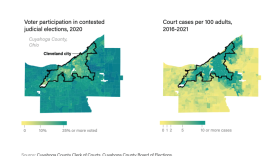By The Marshall Project and Cleveland Documenters
Judges decide the fate of thousands of Clevelanders each year. But In November 2020, during the last presidential election, about a third of Cuyahoga County voters who showed up at the polls skipped voting in races for judges who hear felony cases.
As a result, only about a quarter of the total votes in races for judge that year came from Cleveland residents, even though they face criminal charges at more than four times the rate of people from the suburbs.
That striking imbalance means that the predominantly White suburbs effectively had three times more power than the majority Black city in selecting judges.
Voting participation varied widely: Nearly half left judicial races blank on their ballots in several Cleveland precincts, while just over 10% did so in an area of suburban Shaker Heights, according to county voting records analyzed by The Marshall Project.
The reasons that some voters don’t participate range from a deep distrust of the justice system, to simply not having enough information when voting to elect or remove judges.
To learn more from the perspective of residents — some who vote and some who don’t —The Marshall Project collaborated with Cleveland Documenters, who interviewed more than 40 people about where they learn about judicial candidates, whether the information is helpful and what more they’d like to know about them.
Here’s some of what we learned ( if you don't immediately see the following section, please refresh the page):
Interviews were conducted by these Cleveland Documenters: Marian Bryant, Kathryn Johnson, McKenzie Merriman, Alicia Moreland, Angela Pohlman, Keith Seward, Mildred Seward and Chau Tang
This story is published in partnership with The Marshall Project, a nonprofit newsroom covering the US criminal justice system. You can learn more about Testify here, or sign up to learn more about our Cleveland reporting here.
Copyright 2022 WKSU. To see more, visit WKSU.



![[Elan Kiderman Ullendorff / For The Marshall Project]](https://npr.brightspotcdn.com/dims4/default/741ae1a/2147483647/strip/true/crop/2000x1020+0+0/resize/880x449!/quality/90/?url=http%3A%2F%2Fnpr-brightspot.s3.amazonaws.com%2Flegacy%2Fimages%2Fnews%2Fnpr%2F2022%2F01%2F1076075778_1467433422.jpg)

